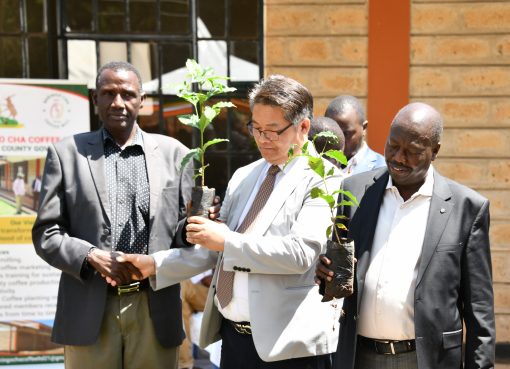Stakeholders in Uasin Gishu have submitted their views on the National Policy for the prevention, management and control of Alcohol, drugs and substance abuse.
The government through the policy, aims to establish a national framework for addressing alcohol and drug abuse (ADA) in order to protect and promote the health, safety and wellbeing of the Kenyan population through harmonised, coordinated and clear approaches to ADA management.
The policy will set a platform for comprehensive implementation mechanisms to ensure efficient and effective prevention interventions, treatment and rehabilitation programmes, enforcement and monitoring mechanisms for reducing the harmful effects of ADA.
Speaking during the stakeholders’ consultative forum at the Eldoret National Polytechnic, Eldoret, the National Authority for the Campaign against Alcohol and Drug Abuse (NACADA) Chair Rev Stephen Mairori pointed out that they have also been in other regions asking Kenyans to give their views to help improve the policy.
Dr Mairori noted that the policy will inform other laws that the counties will put in place because they also have a responsibility in the war against illicit alcohol.
The chair added that with a policy it would be easy for the legislators within the county to come up with laws that will help in the sector.
He lauded the participants as he assured them that their views will be taken into account as they continue to visit other areas with issues of alcohol and drugs as well so that they have the best policy that will guide the nation.
“This has been clearly pronounced by the head of state, his deputy and the CS interior and that we are not in a good place, so we have to do something as a country. The president is working hard to see that our national economy grows, we have the infrastructure but we don’t have the people to make use of this as they have been affected by alcohol and drugs and this is a loss to the government,” explained the NACADA Chair.
Rev Mairori affirmed that the challenge of alcohol and drug abuse in the country is so serious that they have taken it as a serious war as the national government adding that they are happy the county governments have come on board to help win the war on the ground.
He mentioned that there are those who are seriously affected by alcohol and drug abuse as it alters the brain and soon becomes a disease.
Additionally, when people are in that state, they need treatment and that they are working with those who have rehabs to see that those in need of treatment are helped, he added.
The chairman hinted at plans by the national government to establish a rehabilitation centre in every county, to ensure those with Alcohol and Substance Use Disorders (ASUDs) are treated in order to get back to normal life and contribute to nation building.
The chair reiterated that the 25 resolutions of the meeting that was chaired by the deputy president are very clear for any outlet that doesn’t meet the national law and will be applied uniformly across the country.
He encouraged law enforcement agencies to work with diligence since the law is uniformly applied with no exemptions at all.
“The deputy president has come and has spoken on record saying there is no one who infringe on the enforcement of the law because the policy of the government is that we need to save our nation from this menace. I think the law enforcers will do their work as per the law,” said. Rev Mairori.
The NACADA chair alluded that they are bringing all stakeholders like religious leaders, council of elders on board because they are key leaders in the community.
On his part Rtd Maj John Seii, chairman national council of Elders lauded the government efforts to include elders in the fight against the menace noting that they are key stakeholders since they are presently available at homes and communities and know what happens on the ground hence can propose better strategies to combat alcohol.
He affirmed the elders’ commitment to work with NACADA noting that they are in great shock as elders to see that alcohol and drug abuse has ruined the lives of the youth, both boys and girls.
Rtd Maj Seii decried that a nation with rampant abuse of alcohol and drugs will eventually have its workforce reduced.
“We are there to fight to make sure that we leave behind a sober nation, a country that knows how to control any vices in the society like this ADA. We are on board and we will wage together with NACADA what is called total war from the sea, air and on land,” said Seii.
Turbo Deputy County Commissioner (DCC) Charle Igiha lauded the collaboration with the county government against illicit alcohol and assured support to the implementation of the policy to save the nation from the menace which is a threat to security, health and across other sectors.
The DCC called for involvement of politicians’ views on the draft policy since they are key stakeholders in terms of legislation to help in the Supply and Demand Suppression strategy to win the war against ADA.
Uasin Gishu County Director, Alcoholic Drinks Control Board, Koiya Arap Maiyo, said the county is committed to working closely with all the government agencies and partners to ensure the illicit alcohol is controlled.
Collins Kemboi, Youth Chair Uasin Gishu, called for the banning of the sale of alcohol products at higher institutions of learning to protect the youth.
He suggested the collaboration between state and non-state actors in the treatment of those affected by Alcohol Use Disorders (AUDs).
In his remarks Rutto Kolem, an addiction counsellor and recovery coach, Universal Recovery Curriculum (URC), NACADA pointed out that the youth especially at the higher learning institutions have a lot of freedom to indulge in drugs especially during concerts like fresher nights where he claimed they are recruited into drugs by dealers.
He called for regulations to curb such events in universities and colleges since he said that is where students become victims of alcohol and drugs use during studies at the university.
He commended government efforts in rehabilitating those with Alcohol and Substances Use Disorders (ASUDs) including himself.
By Ekuwam Sylvester




